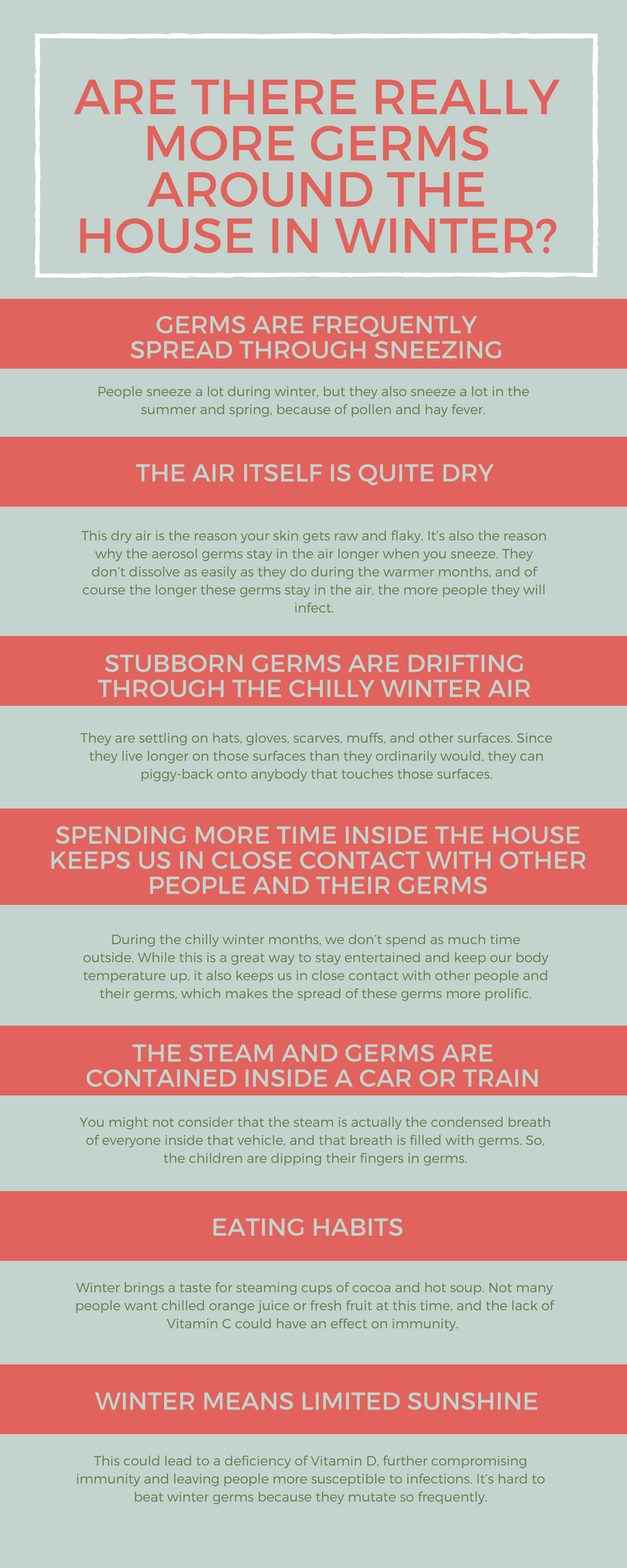Everybody seems to catch the sniffles in winter, so it’s natural to assume there must be more germs around during the cold season. As it turns out, that’s not necessarily the case. Although the weather has a role to play in colds, flu, and other winter maladies, it’s not quite the role that you’d expect.
Germs are frequently spread through sneezing. People sneeze a lot during winter, but they also sneeze a lot in the summer and spring, because of pollen and hay fever. They might also sneeze quite a bit if they’re cooking with pepper. So, clearly, sneezing in itself is not the issue.
Studies have shown the trouble with sneezing is more about the amount of moisture in the air. If the weather is humid, sneezing does a lot less damage. During spring and summer, there’s a lot of water vapour in the air, and that makes the germs in a sneeze dissipate much faster. It’s possibly the main reason why colds and flu aren’t as frequent during steamy months.
On the surface, it seems that winter months have a lot more moisture than warmer months, especially with all the rain and snow. But have you ever wondered why your skin gets so dry during the winter? The low temperatures tend to liquefy the moisture in the air, and liquid particles are much larger than gaseous water vapour particles. This means that although there may be rain and fog and maybe even snow, the air itself is quite dry.
This dry air is the reason your skin gets raw and flaky. It’s also the reason why the aerosol germs stay in the air longer when you sneeze. They don’t dissolve as easily as they do during the warmer months, and of course the longer these germs stay in the air, the more people they will infect.
As these stubborn germs are drifting through the chilly winter air, they are settling on hats, gloves, scarves, muffs, and other surfaces. Since they live longer on those surfaces than they ordinarily would, they can piggy-back onto anybody that touches those surfaces. Cleaning is probably the last thing you want to do when you’re feeling so cold, but it can actually help. Wipe visible surfaces with soap and warm water. You can add some disinfectant for extra germ-killing power, or use anti-bacterial cleaning agents.
Being winter, we will spend a lot of time blowing into our hands, cupping our chins and touching our faces. All that direct contact only serves to collect those accumulated germs and put them back into our bodies or pass them to someone else’s.
During the chilly winter months, we don’t spend as much time outside. Instead, we huddle in houses, offices, theatres, and other spaces that are cosy and warm. While this is a great way to stay entertained and keep our body temperature up, it also keeps us in close contact with other people and their germs, which makes the spread of these germs more prolific.
Have you ever been inside a car or train and noticed the steam on the windows? Kids sometimes like to make a game of it, drawing on the steamy windows. You might not consider that the ‘steam’ is actually the condensed breath of everyone inside that vehicle, and that breath is filled with germs. So, the children are dipping their fingers in germs.
Also, the ‘steam’ that has settled on the window is simply the warm air that you can see. There’s a lot warmer, unseen air floating around the car, and with everyone in tight quarters, that air is circulating in and out of everyone’s nasal passages. All those germs migrating in small spaces begin to explain why colds get so ubiquitous during these chilly seasons.
One factor you may not have thought of is sunshine and eating habits. Winter brings a taste for steaming cups of cocoa and hot soup. Not many people want chilled orange juice or fresh fruit at this time, and the lack of Vitamin C could have an effect on immunity.
Winter also means limited sunshine, which could lead to a deficiency of Vitamin D, further compromising immunity and leaving people more susceptible to infections. It’s hard to beat winter germs because they mutate so frequently.
Every time you catch a cold, you’re essentially dealing with a different viral strain. Now that your immunity is compromised and the virus survives better in dry conditions with low temperatures, you’re soon under the weather and everyone around you is at risk too. So, no, winter does not contain more germs than other seasons. It simply provides optimal conditions for these germs to survive, thrive, and spread at much faster rates.




